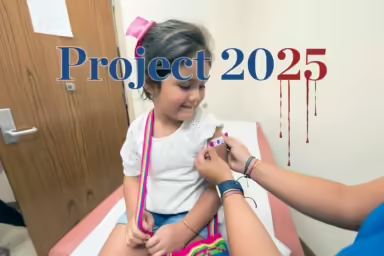A bipartisan coalition of senators wants answers on the health effects of the toxic East Palestine train derailment — and they want them now.
|
Listen To This Story
|
Two months after a train derailment in East Palestine, OH, released dangerous chemicals and sent residents fleeing, a bipartisan group of senators is urging the National Institutes of Health (NIH) to immediately investigate the health effects of the accident.
“We repeatedly hear concerns about the potential impact of both acute and chronic exposure to the hazardous chemicals released in the train derailment,” write Sens. Sherrod Brown (D-OH), J.D. Vance (R-OH), John Fetterman (D-PA), and Bob Casey (D-PA). “We request that the National Institute of Environmental Health Sciences (NIEHS) assist the impacted communities in Ohio and Pennsylvania by helping conduct the needed health research investigations.”
On February 3, a 50-car train operated by Norfolk Southern derailed near East Palestine. The train carried hazardous materials, including the carcinogen vinyl chloride, and caused a large fire and plume of heavy smoke. Officials issued an evacuation order the next day.
Residents who evacuated have since returned, but they remain wary.
“Our government told us it was ‘safe’ to come home. Within minutes, a train went through town — on top of highly contaminated soil that was left behind,” Misti Allison, an East Palestine resident, told the Senate Commerce, Science and Transportation Committee last month. “But we don’t know if it’s really safe. Since returning home, people and animals are sick. The EPA is telling us the data is fine while independent researchers are telling us that there are high levels of acrolein and other cancerous chemicals around us. Who do we trust with these conflicting reports?”
The senators urge the NIH to consult the Centers for Disease Control and Prevention (CDC) and National Academies of Science, Engineering and Medicine (NASEM) to find the best course of immediate action.
The lawmakers make it clear that they intend to keep a close eye on the situation and the federal government’s response.
“We request additional information on immediate and short-term actions NIEHS is able to take to mobilize existing assets — including efforts to augment and supplement any existing grantees who are equipped to aid in an immediate research response — and deploy resources to respond to the biomedical research needs of the community,” they write.

With initial cleanup efforts completed, research is an urgent priority. The largely unknown impact of the derailment worries residents in East Palestine and the surrounding areas, the senators say.
“While we appreciate the coordination of the work that has already been done, we request additional information on any steps that NIEHS has taken to begin research efforts in the communities affected by the Norfolk Southern train derailment and the plume that resulted from the subsequent spilling and burning of toxic chemicals,” they write.
Seven CDC workers involved in cleanup efforts have fallen ill with symptoms similar to those residents reported, according to reporting from CNN. Symptoms subsided within 24 hours, but questions about long-term effects remain.
These unknowns leave residents facing a difficult choice.
“I mean, of course, cancer is a huge concern, because that’s the word that keeps getting thrown around that in 10 years for kids to be diagnosed with cancer, and that’s terrifying,” local resident Charisse Munyon told WBNS 10 Investigates. “But also it’s terrifying to me to uproot my family and move somewhere else, my kids have both been here since they were in preschool. So like, I feel like I’m damned if I do, damned if I don’t.”
A swift ramp-up in research efforts is key, the senators say. Calling on existing local partners could enable a speedy response.
NIH grantees active in Ohio and Pennsylvania include University of Pittsburgh assistant professor Juliane Beier, who researches the effects of vinyl chloride. Other local grantees include Prometheus Technologies, a company whose technology could aid in identifying volatile organic compounds, and Drexel University associate professor Jane Clougherty, an expert in the community impacts of airborne toxins.
All four senators have, since the accident, sponsored or co-sponsored legislation to address future derailments. Three of them also introduced a bill to provide assistance to the local responders.
 The Railway Safety Act, which all of them support, increases the maximum penalties imposed on rail companies and forbids them from operating trains with one-person crews.
The Railway Safety Act, which all of them support, increases the maximum penalties imposed on rail companies and forbids them from operating trains with one-person crews.
A related partisan bill sponsored by Fetterman, Casey, and Brown expands safety standards, makes safety inspections publicly available, and requires railroad companies to join a “close call” reporting system.
“This bill will implement commonsense safety reforms, hold the big railway companies accountable, protect the workers who make these trains run, and help prevent future catastrophes that endanger communities near railway infrastructure,” said Fetterman. “Working Pennsylvanians have more than enough to think about already — they should never have been put in this horrible situation.”
A third bill, which Vance did not co-sponsor, provides up to $3 million in assistance with the aftermath of hazardous train derailments and establishes a trust, funded by a new hazardous materials emergency fee, from which to draw assistance for local communities.
Ohio and the Department of Justice have sued Norfolk Southern. The senators’ letter suggests that Congress can recover the costs of NIH’s redoubled efforts from Norfolk Southern.
But money is not the primary issue on the minds of East Palestine residents. When testifying before the Senate last month, Allison told lawmakers that, since they were not allowed to play on the playground anymore, local children had invented a game called “Evacuation.”
“This train derailment has robbed our kids of their childhood, and perhaps more.”




